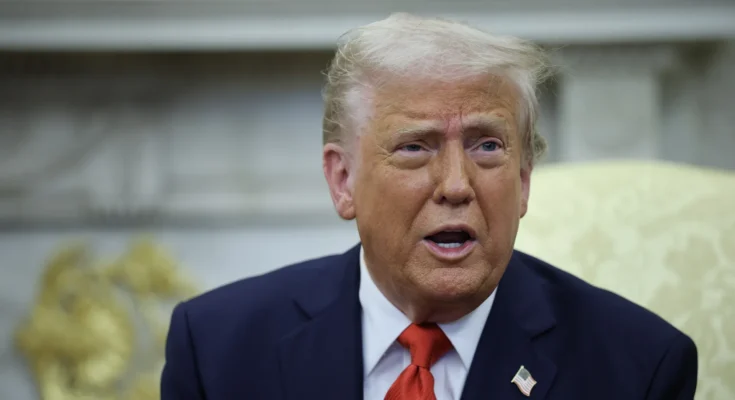Here’s the latest on former President Trump’s updated immigration policies…

Major Policy Changes & Executive Actions
1. Expanded Public‑Benefits Ban
A new federal policy redefines “federal public benefits” to include 13 additional programs—such as Head Start, community health centers, and licenses—effectively barring undocumented immigrants from accessing them. Providers are raising serious concerns over confusion, public health risks, and disruptions to services
2. No Bond for Undocumented Detainees
ICE has enacted a sweeping policy preventing bond hearings for undocumented migrants, regardless of when they entered the U.S. Decisions are now made by ICE officers instead of immigration judges, with detention capacity expanded dramatically—up to 100,000 beds
3. Aggressive Deportation Push
ICE, bolstered by funding increases from $8B to $28B and new legislation, is targeting non-criminal undocumented migrants. The goal: deport 1 million people this year. State-level operations (like Florida’s “Alligator Alcatraz”) are being used to highlight these enforcement efforts
4. Cutting Legal Protections
-
TPS & Humanitarian Parole: DHS under Secretary Noem is terminating protections for over 1.2 million Temporary Protected Status holders and phasing out parole programs for Haiti, Venezuela, Cuba, and more
-
SIJS: A legal challenge has emerged to reverse the ending of Special Immigrant Juvenile Status, which provided protections and legal routes for abused/neglected migrant children
5. Birthright Citizenship Rolled Back
Executive Order 14160 redefines the 14th Amendment’s Citizenship Clause, aiming to restrict automatic citizenship to those born in the U.S. only if at least one parent is a citizen or legal permanent resident. Courts have already issued nationwide injunctions blocking its enforcement

6. Enforcement Infrastructure & National Emergency
-
Proclamation 10886: Declares a national emergency at the southern border, freeing up military resources, expanding detention infrastructure, and ramping up border wall construction
-
Guantánamo and Military Bases: Plans are in motion to house detainees at Guantánamo Bay and U.S. military bases (e.g., NJ, Indiana), provoking legal, logistical, and humanitarian concerns.
7. “One Big Beautiful Bill Act” (OBBBA)
Passed July 4, this legislation dedicates over $170B to immigration enforcement—allocating $45B for 100,000 new detention beds and tens of billions more toward ICE staffing, border security, and wall projects—alongside cuts to health care, nutrition, and tax benefits for immigrants and their families.
8. Temporary Visa Easing for Agriculture
In response to industry complaints, the administration streamlined the H‑2A seasonal worker visa, making it easier for U.S. farmers to legally recruit foreign labor—though undocumented workers remain excluded.
9. Creative Deportation: Third‑Country Removals
The U.S. began deporting non-citizen convicts to third countries like Eswatini when home countries refused to take them—a highly controversial step enabled by a recent Supreme Court ruling.

Public & Legal Response
-
Declining Approval: Trump’s handling of immigration saw a drop in approval to 44%, with 56% disapproval—up from 54% approval in March. Even conservatives acknowledge the deportation tactics are “too harsh”.
-
Changing Public Sentiment: Gallup polls show only 30% of Americans want reduced immigration (down from 55% last year), while 79% view immigration positively. Approval of Trump’s approach now dips to just 35%.
-
Legal Challenges Mount: Multiple lawsuits challenge the bond restrictions, birthright citizenship rollback, termination of refugee programs, and the ban on SIJS protections.
Final Take
Trump’s second-term immigration strategy is defined by rapid executive action and sweeping legislation aimed at enforcement and restriction:
-
Enforcement: Massive expansion in detention, funding, deportation operations, and ICE authority.
-
Legal Restrictions: New policies limiting bond, public benefits, birthright citizenship, TPS, parole, and child protections.
-
Public & Political Pushback: Growing legal resistance and declining public approval challenge the administration’s approach.
More information below..



